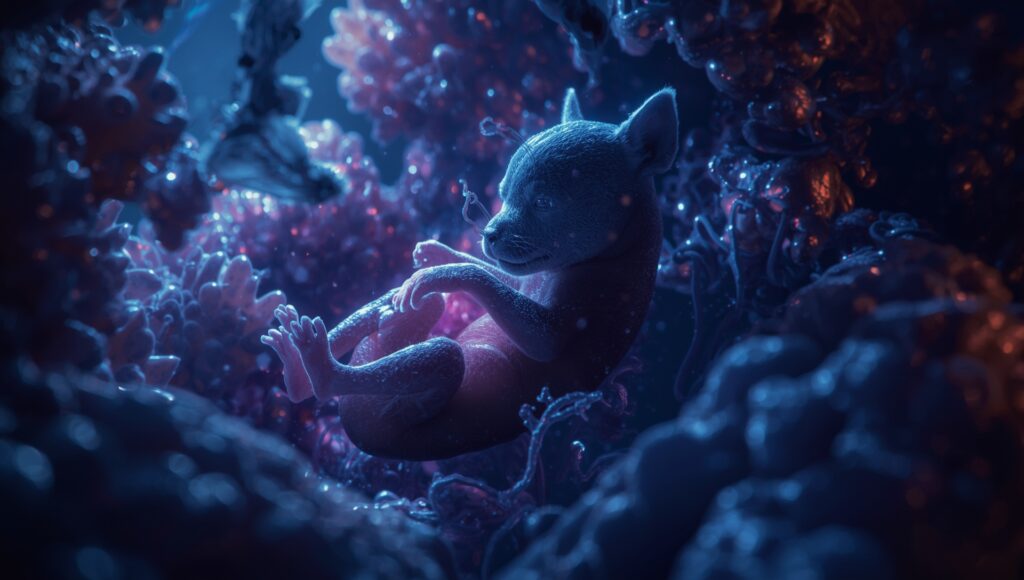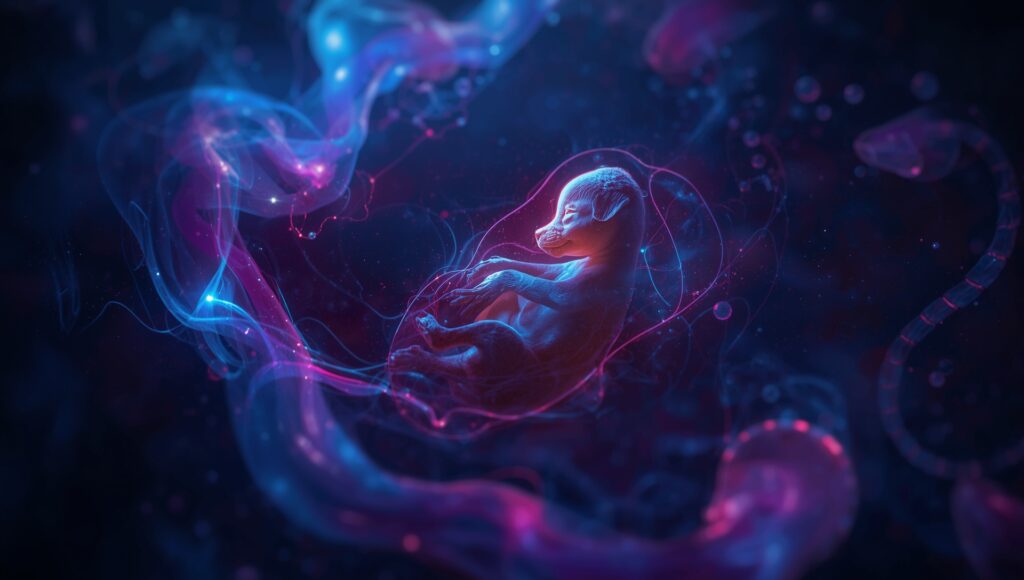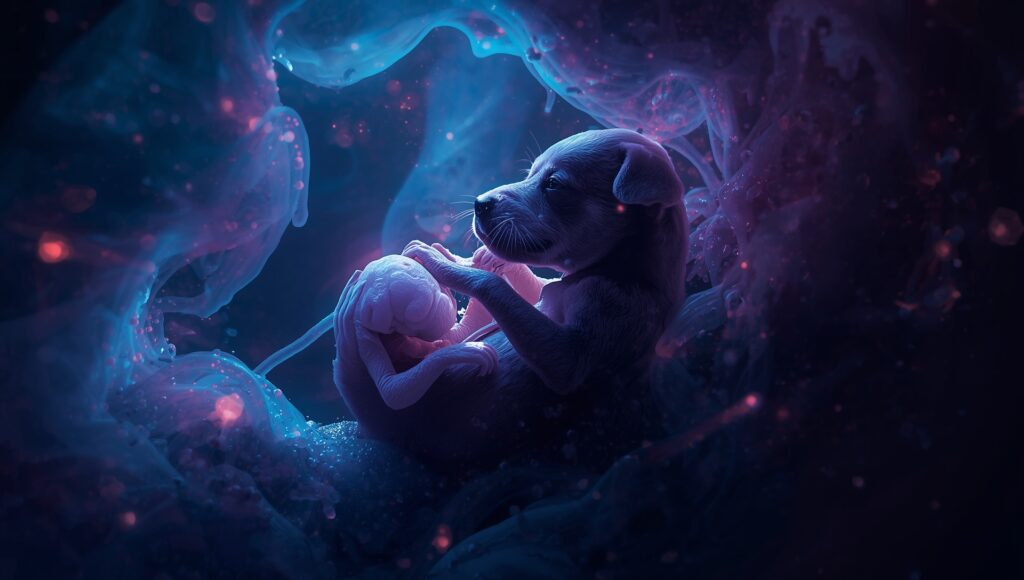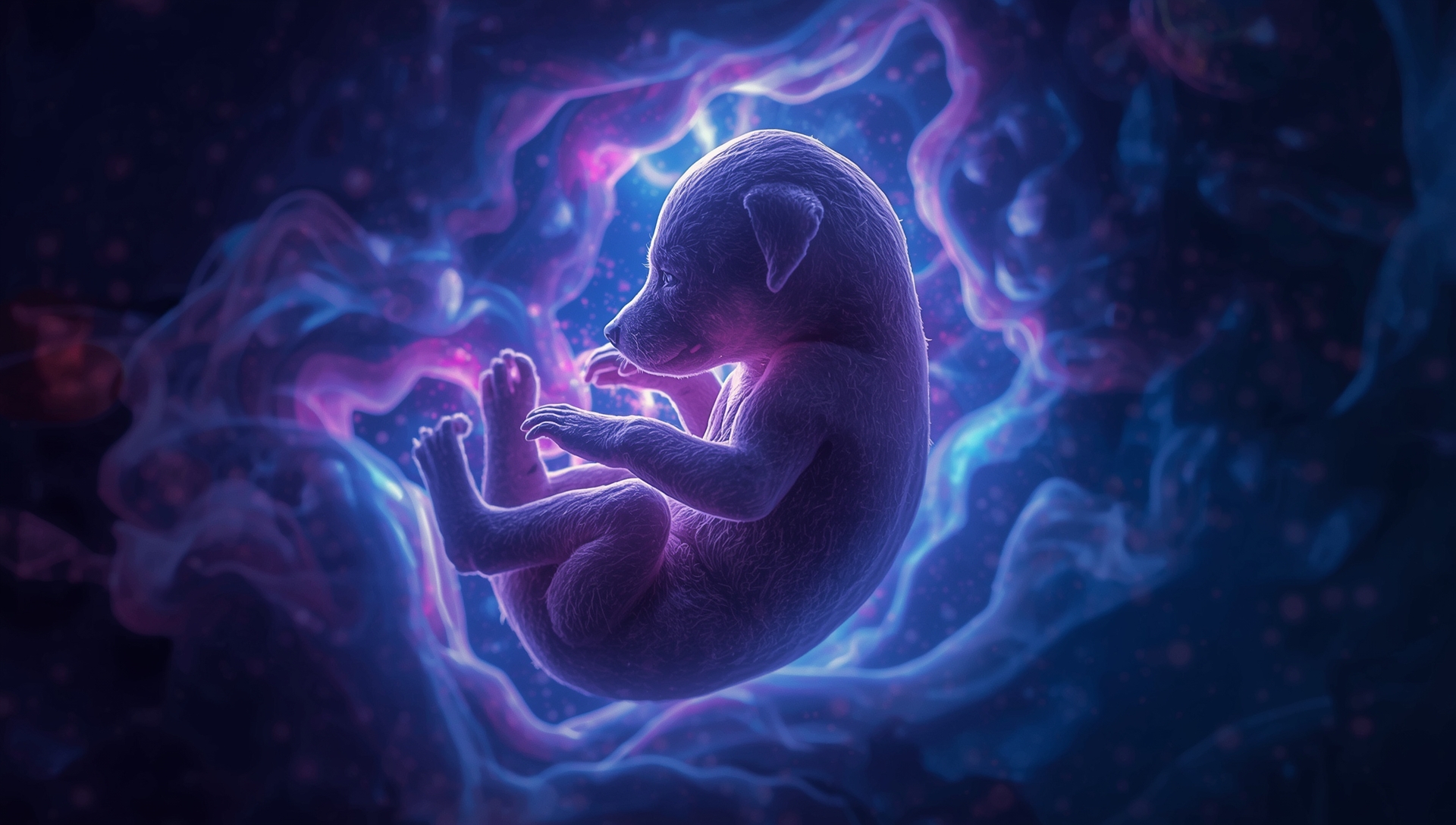How do dogs get nutrition in the womb is a fascinating question that reveals the complex bond between mother and pup long before birth. Puppies depend entirely on their mother’s body during gestation, receiving nutrients, oxygen, and immune support through specialized biological systems. Understanding this process helps dog owners appreciate the importance of maternal health and prenatal care.
How Do Dogs Get Nutrition in the Womb?
Dogs carry puppies for about 63 days, although the exact length varies slightly with breed and litter size. During this time, puppies go through several important stages:

Stages of Canine Pregnancy
- Fertilization: The sperm fertilizes the egg, forming a zygote.
- Early cell division: Cells rapidly multiply and travel toward the uterus.
- Implantation: The embryos attach to the uterine wall.
- Placental development: Nutrient transfer systems form to support growth.
- Organ formation: By the fourth week, organs and skeletons begin to develop.
- Final growth: In the last two weeks, puppies gain weight and prepare for birth.
Each stage relies on maternal nutrition and placental function.
The Placenta: The Puppy’s Life Support
The placenta is the most critical structure for delivering nutrition. It forms between the mother’s uterine lining and each embryo, connecting through the umbilical cord.
Placenta Functions
- Nutrient transfer: Glucose, proteins, fats, vitamins, and minerals pass into the puppy’s bloodstream.
- Oxygen exchange: The placenta provides oxygen while removing carbon dioxide.
- Waste removal: Metabolic waste is carried back to the mother.
- Hormonal support: Hormones regulate pregnancy and fetal stability.
Without the placenta, the embryo cannot survive.
Umbilical Cord: The Direct Nutrient Highway
Each puppy is attached to the placenta via its own umbilical cord. This cord carries blood rich in oxygen and nutrients to the fetus, while also removing waste.
When puppies are born, the mother instinctively severs the cord, marking the transition from womb nutrition to milk feeding.
What Nutrients Do Puppies Receive in the Womb?
Puppies receive the same essential nutrients humans need, though in species-specific amounts:
- Proteins: For muscles and organ tissue.
- Fats: To support energy and brain development.
- Carbohydrates (glucose): The main energy source.
- Vitamins: A, D, E, and B-complex for immunity and metabolism.
- Minerals: Calcium and phosphorus for bones, iron for red blood cells.
- Water: Critical for hydration and nutrient transport.
These nutrients depend entirely on the mother’s diet and health.
The Role of Maternal Nutrition
A mother’s diet directly influences the quality of nutrition puppies receive in the womb. Poor maternal nutrition can result in weak, underweight puppies or complications at birth.
Key Dietary Needs for Pregnant Dogs
- High protein intake for fetal tissue growth.
- Healthy fats such as omega-3s for brain and eye development.
- Extra calories in the final trimester when puppies grow rapidly.
- Balanced vitamins and minerals as recommended by veterinarians.
Veterinary nutrition experts emphasize that pregnant dogs should never be placed on restrictive diets.
For more insights on pet diet, check out vital info to feline diet—while it covers cats, the principles of balanced nutrition apply broadly.

Risks of Poor Maternal Diet
If the mother does not receive proper nutrition:
- Puppies may be born underweight.
- Litter size may be reduced.
- Puppies may face developmental delays.
- The mother could struggle during labor.
According to Petsfura, prenatal care and balanced diets are among the most important factors in pet health outcomes.
Oxygen: The Unseen Nutrient
In addition to food, oxygen is vital. The mother breathes for the puppies, transferring oxygen through the placenta. This oxygen fuels metabolism and brain development.
Any health condition that reduces maternal oxygen flow—such as anemia or lung disease—can negatively affect fetal growth.
Hormones and Pregnancy Support
Pregnant dogs produce hormones that regulate gestation and nutrition transfer:
- Progesterone: Maintains pregnancy.
- Relaxin: Expands the uterus.
- Estrogen: Prepares mammary glands for milk production.
These hormones also help regulate blood supply to the placenta, ensuring puppies continue to receive nourishment.
Veterinary Care During Pregnancy
Regular veterinary care ensures both mother and puppies remain healthy. Standard prenatal care may include:
- Ultrasounds to monitor fetal growth.
- Adjusted feeding schedules.
- Deworming to prevent parasite transmission.
- Vaccinations before pregnancy to pass on immunity.
For related reading, explore how to keep pets healthy and happy.

From Womb Nutrition to First Milk
At birth, puppies shift from womb nutrition to nursing. The very first milk, called colostrum, is rich in antibodies that protect newborns from disease until their own immune systems develop.
This transition shows how perfectly designed the maternal system is to protect life from conception to early puppyhood.
Expert Insight
Veterinary scientist Dr. Patricia Olson notes:
“The placenta is a temporary but vital organ. Without maternal nutrition, oxygen, and immune support, puppies cannot develop properly in the womb.”
Key Points Recap
- Puppies depend on the placenta and umbilical cord for nutrients and oxygen.
- Maternal diet quality directly shapes puppy development.
- Essential nutrients include proteins, fats, vitamins, and minerals.
- Oxygen transfer is just as important as food.
- Veterinary care ensures pregnancy health.
- At birth, nutrition shifts to colostrum and milk.
Conclusion: The Miracle of Womb Nutrition
How do dogs get nutrition in the womb? The answer lies in the seamless system of maternal care, the placenta, and the umbilical cord. Puppies are nourished by every heartbeat and meal of their mother until birth, when they begin a new journey through nursing.
For pet owners, this highlights a vital truth: caring for a pregnant dog is more than love—it’s a scientific responsibility that ensures puppies enter the world strong and ready to thrive.
Explore more animal care insights on the Michuz Blog or visit Petsfura for practical pet guidance.



